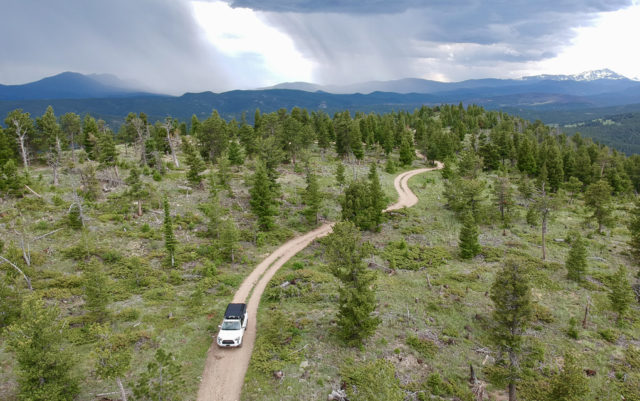
As environmentally responsible as it is to own an electric vehicle, accessing Colorado’s remote backcountry is rarely a two-wheel-drive endeavor. Crawling along old dirt mining roads, braving rocky, two-track trails, splashing through muddy creek beds and navigating snowy mountain passes — it’s all part of the game for Colorado’s outdoor enthusiasts.
But it also usually requires bigger cars with lower gas mileage. It’s why there are so many SUVs and trucks on Colorado’s roads: people need them to travel safely throughout the state.
Unfortunately, people don’t just use those bigger cars to get up to the mountains on their days off — they also use them to commute to work, run errands and get around town. According to the Colorado Department of Transportation, approximately 33% of Colorado’s carbon emissions currently come from the transportation sector, much of which gets trapped against the mountains.
The result along the Front Range: the infamous “brown cloud.”
That presents a conundrum: How can environmentally conscious, outdoorsy Coloradans own sustainable vehicles without forfeiting their ability to safely explore the Rockies?
Answering that question is a high priority for the state, as the Environmental Protection Agency (EPA) recently declared the Denver area a “serious” violator of federal air quality standards.
But Travis Titus, a Colorado-born, CU-educated mechanical engineer, hopes he might have an answer with his business, Titus Adventure Company (TAC), which rents souped-up vehicles for high-country and bad-weather adventures.
“There’s so many great new technological advances for urban transportation,” Titus says. “We’ve got all the ridesharing options, autonomous vehicles, electric vehicles; those are going to be awesome for our daily commuter stuff. But they’re not going to cut it for mountain adventures.”
TAC offers a lineup of 2019 Toyotas, each pimped out and custom-outfitted to the customer’s intended adventure. They’ve all got lifted suspension and high-quality all-season tires. Some have an insulated pop-up tent fixed to the top, complete with foldable awnings for shade and rain protection. If you’re going biking, TAC will provide the bike rack; if you’re going fishing, it’ll provide the rod quivers; it’s got winter bundles for cold weather camping, and water bundles for river trips. The outdoor equipment Titus outfits his vehicles with is the best on the market.
Titus has also partnered with the Colorado Carbon Fund to offset all of the company’s vehicle emissions. But what really sets TAC apart is the 20% discount offered to anyone who owns an electric vehicle.
“I think that sounds like a really good idea,” says Cindy Copeland, the air quality specialist for Boulder County. Particularly in light of the EPA’s recent downgrade of Colorado’s non-attainment area, she says.
That non-attainment area spans nine counties: Douglas, Jefferson, Arapahoe, Adams, Denver, Broomfield, Weld, Larimer and Boulder — all of which now face more stringent emissions regulations from the state, Copeland says.
It’s a move Governor Jared Polis prompted in March 2019, when he sent a letter to the EPA requesting Colorado withdraw its appeal for an extension — one that would have given the state additional time to come into compliance with the EPA’s air quality standard, postponing any serious policy changes.
Now though, the pressure is on for those companies that the state has identified as “major stationary sources” of pollution — many of which are oil and gas-related.
Copeland says oil and gas and vehicle emissions are the county’s two largest sources of local pollution. However, while the EPA downgrade and new state regulations attempt to crack down on those major stationary polluters, they won’t do much to address vehicle emissions.
“Unfortunately, the state doesn’t really have the tools to be able to regulate vehicles to that extent,” Copeland says, which is why she thinks the TAC model of incentivizing sustainable vehicle ownership is such a good idea.
“I’m trying to provide people with an alternative,” Titus explains. “My big pie-in-the-sky ambition is to shift the needle a little bit. It’s going to take a lifestyle and cultural change and it’s going to take some momentum and some effort to get people on board. But I think it’s doable.”














